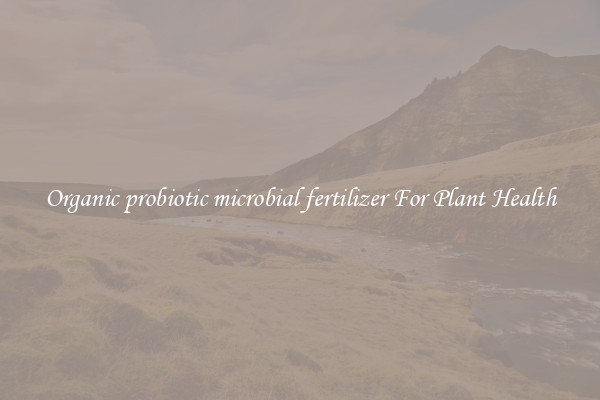Organic probiotic microbial fertilizer For Plant Health
In recent years, there has been a growing interest in organic probiotic microbial fertilizers for plant health. These fertilizers are a natural and sustainable alternative to conventional chemical-based fertilizers. They work by harnessing the power of beneficial microorganisms to promote plant growth and health.

One of the key benefits of organic probiotic microbial fertilizers is their ability to improve soil health. These fertilizers contain a rich diversity of beneficial microorganisms such as bacteria, fungi, and algae. When applied to the soil, these microorganisms establish a symbiotic relationship with the plants, forming a mutually beneficial partnership. The microorganisms help break down organic matter in the soil, releasing vital nutrients that are essential for plant growth. They also protect plants from harmful pathogens and pests by producing natural antibiotics and enhancing the plant's immune system.
Another advantage of organic probiotic microbial fertilizers is their ability to enhance nutrient uptake by plants. The beneficial microorganisms in these fertilizers have the ability to solubilize nutrients such as nitrogen, phosphorus, and potassium present in the soil, making them more available for plant uptake. This leads to improved nutrient absorption by the plants, resulting in healthier and more robust growth.
Furthermore, organic probiotic microbial fertilizers have shown to increase the tolerance of plants to environmental stresses. These fertilizers contain microorganisms that produce enzymes and hormones that help plants cope with adverse conditions such as drought, heat, and disease. By improving the plant's resilience, organic probiotic microbial fertilizers help to reduce crop losses and ensure higher yields.
Another compelling advantage of organic probiotic microbial fertilizers is their positive impact on the environment. Unlike chemical-based fertilizers, organic probiotic microbial fertilizers are non-toxic, do not harm beneficial insects or pollinators, and do not contaminate groundwater or soil. Additionally, these fertilizers contribute to the long-term improvement of soil health and fertility, reducing the need for synthetic fertilizers and minimizing environmental pollution.
In conclusion, organic probiotic microbial fertilizers offer a natural and sustainable solution for promoting plant health. Their ability to improve soil health, enhance nutrient uptake, increase stress tolerance, and their positive environmental impact make them an attractive option for farmers and gardeners alike. By harnessing the power of beneficial microorganisms, these fertilizers contribute to healthier plants, higher yields, and a more sustainable agricultural system.

View details

View details

View details

View details








